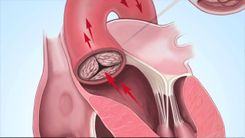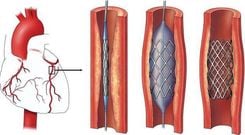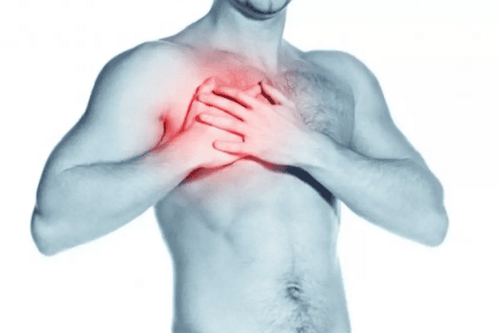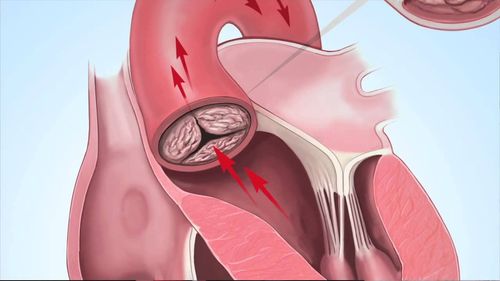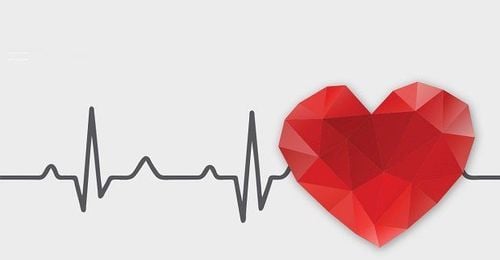Having chest pain when taking a deep breath is a warning sign of many serious health problems. The cause of chest pain when taking a deep breath can come from chest wall disease due to costochondritis or trauma, cardiovascular disease, embolism or infection of the lungs - pleura, etc. When there are symptoms of chest pain when taking a deep breath, the patient needs to go to the doctor for timely detection and treatment.
1. What is chest pain when taking a deep breath?
Having chest pain when taking a deep breath is a warning sign of many serious health problems. This chest pain can start from the left, right or both sides. For each person, the pain can be sharp after taking a deep breath or dull with each inhalation. Symptoms that accompany chest pain can be shortness of breath, cough, etc., or not.
The main mechanism of chest pain when taking a deep breath is that when inhaling, the expansion of the chest causes the lungs to expand as well. When any structure related to the chest wall such as the lungs, pleura, pericardium, and rib cartilage is damaged, chest pain will appear when taking a deep breath.
2. Causes of chest pain when taking a deep breath
The cause of chest pain can be due to heart or non-cardiac disease. In particular, chest pain when taking a deep breath is an atypical form of chest pain due to the heart. In addition, there are other causes of chest pain when taking a deep breath such as:
2.1 Pneumonia
Pneumonia is an inflammation of the lung parenchyma, including inflammation of the terminal bronchioles, alveolitis, and inflammation of the connective tissue (interstitial tissue) of the lungs. The cause of pneumonia can be bacteria, viruses, and fungi, of which influenza virus and streptococcus are common. In the elderly, pneumonia is mainly caused by bacteria.
Pneumonia causes chest pain and is characterized by symptoms of fever, cough, shortness of breath, fatigue, etc. Especially if the inflammation spreads to the pleura, the pain will become more obvious and severe when taking a deep breath.
If you have symptoms of pneumonia, you should see a doctor as soon as possible. The decision to treat will depend on the risk factor, the cause and the severity of the disease. If the pneumonia is caused by bacteria, antibiotics are the most effective treatment.
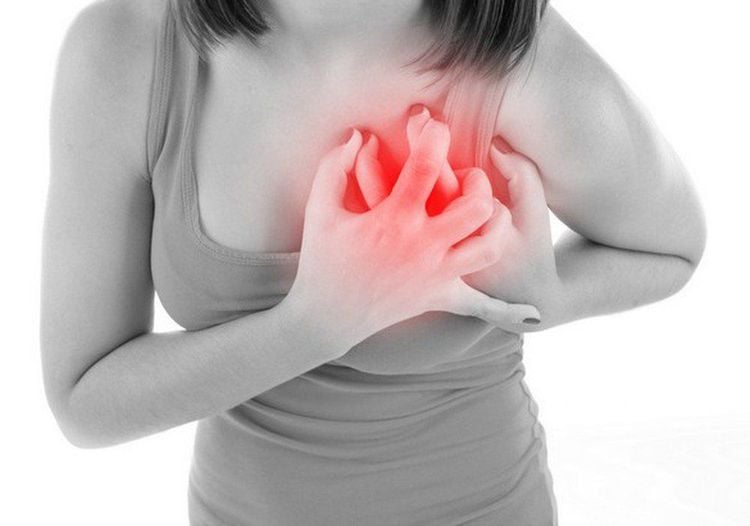
2.2 Pleurisy
The pleura is a thin membrane that covers the surface of the lungs, consisting of 2 layers: parietal and visceral, forming a cavity, called the pleural cavity, inside there is a small amount of fluid so that the 2 pleural layers can slide easily against each other. If pneumonia spreads to the outer surface of the lungs, it will lead to pleurisy. Bacteria and viruses are 2 common agents that cause pleurisy. Symptoms of pleurisy may include:
- Fever;
- Cough;
- Shortness of breath;
- Chest pain that increases when breathing deeply or when sneezing, the pain may spread to the shoulder blade;Unexplained weight loss.
2.3 Pulmonary embolism
Pulmonary embolism is a condition in which a blood clot partially or completely blocks the pulmonary artery, usually due to a blood clot moving from the deep veins of the lower limbs. Pulmonary embolism is one of the serious causes of chest pain when breathing. In addition to chest pain, the patient also has symptoms such as difficulty breathing, rapid heartbeat, coughing up blood and right heart failure.
Pulmonary embolism accompanied by shock, if not treated promptly, can cause death. In emergency cases, fibrinolysis is the priority treatment. People with mild and moderate pulmonary embolism can be treated with intravenous anticoagulants or oral anticoagulants (including vitamin K antagonists and new-generation anticoagulants).
2.4 Pneumothorax
Pneumothorax is a condition in which air appears in the pleural cavity. The accumulation of more air will increase the pressure inside the pleural cavity, which can lead to partial or complete collapse of the lung. The cause of pneumothorax is often due to trauma to the chest wall (closed or open), lung trauma and complications of chronic lung diseases such as old tuberculosis or emphysema. In addition, some people who smoke or are tall and thin can also have spontaneous pneumothorax of unknown cause. Common symptoms of pneumothorax are difficulty breathing, chest pain that increases when breathing or coughing, fatigue, rapid heartbeat and pale skin. If the amount of air is small, the disease may gradually subside with rest. However, if the amount of pneumothorax is large, causing symptoms of difficulty breathing and severe chest pain, the patient needs to puncture and drain the air from the pleural cavity to prevent a collapsed lung, which can be life-threatening.
2.5 Lung Cancer
Lung cancer often starts with symptoms such as persistent cough, coughing up blood, shortness of breath and unexplained weight loss. Smoking is also one of the important causes of lung cancer. Chest pain when breathing deeply can also appear if the cancer is related to the pleura.

2.6 Costochondritis
Costochondritis is an inflammation of the cartilage that connects the ribs and the sternum. Causes of costochondritis can be respiratory infections, chest trauma or severe coughing. Costochondritis often causes sharp chest pain along both sides of the sternum, spreading to the back and increasing when coughing or breathing deeply. Costochondritis can usually go away on its own, but if the pain is severe and interferes with daily activities, you should seek medical attention and treatment.
2.7 Pericarditis
The pericardium is the membrane that surrounds and protects the heart, consisting of two layers: the parietal and visceral layers, forming a cavity containing a small amount of fluid. Pericarditis can be caused by agents such as bacteria, viruses, certain medications, heart surgery or trauma, and sometimes occurs in autoimmune diseases such as systemic lupus erythematosus or rheumatoid arthritis.
Pericarditis can lead to constant sharp chest pain or chest pain when taking a deep breath, which is relieved when the patient sits upright and leans forward. In addition, people with pericarditis may also have other symptoms such as fever, shortness of breath, dizziness, lightheadedness, and palpitations.
2.8 Chest trauma
Chest trauma can cause muscle tension, bruising of the chest wall, or rib fractures, leading to chest pain when taking a deep breath. For example, if a person with chest trauma has a broken rib, the broken pieces of the rib will rub against each other and cause chest pain. In addition, broken ribs can also puncture the pleura and lung, causing pneumothorax. Chest pain when taking a deep breath due to this condition can spread to the neck or back.
2.9 Intra-abdominal infection
Intra-abdominal infection can also be the cause of chest pain when breathing, especially if the infection is related to the liver or spleen. Because the liver and spleen are adjacent to the diaphragm when performing the inhalation and exhalation movement, the diaphragm will move up and down with the breathing rhythm, these infected organs will also be affected, causing chest pain and discomfort.

In short, having chest pain when taking a deep breath can be a warning symptom of many dangerous diseases. When this symptom persists, the patient needs to go to a reputable hospital to be examined by a specialist and have a treatment regimen that meets international standards... Vinmec International General Hospital has achieved many successes and gained the trust of many patients.
To arrange an appointment, please call HOTLINE or make your reservation directly HERE. You may also download the MyVinmec app to schedule appointments faster and manage your reservations more conveniently.
